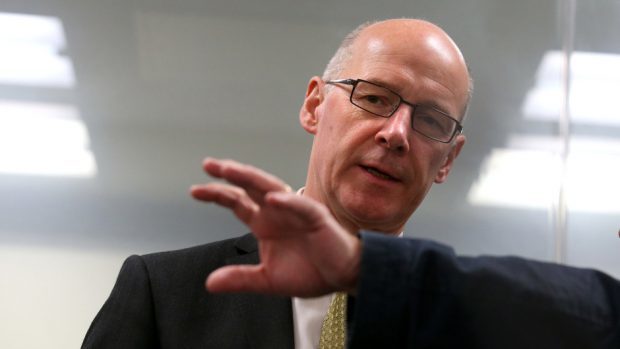John Swinney has confirmed the Scottish Government’s named person scheme is to be scrapped.
The education secretary defied calls to apologise for introducing the scheme as he announced the end of plans to give all Scottish children a mandatory “named person”.
The announcement, which was described as a “humiliation” by the government’s opponents, follows years of criticism.
Since its proposal six years ago, critics had argued the scheme was an unwarranted intrusion into family life. The legislation had also been subjected to a successful legal challenge by anti-named person campaigners.
The scheme was introduced in an attempt to protect vulnerable youngsters by giving every child a “named person” – usually a health visitor or teacher- who would act as a point of contact up to the age of 18.
The proposal was part of the government’s Getting It Right for Every Child (GIRFEC) policy.
But the government’s opponents accused ministers of creating “state guardians”, who would undermine the role of parents in bringing up children.
At Holyrood, Mr Swinney said: “I’m giving notice of our intention to seek to repeal parts four and five of the Children and Young People Scotland Act 2014 using a suitable legislative vehicle in due course.
“The mandatory Named Persons scheme for every child, underpinned by law, will now not happen. We will withdraw our bill and repeal the relevant legislation.
“Instead, existing voluntary schemes that provide a point of contact for support will continue under current legal powers, where councils and health boards wish to provide them, and parents wish to use them.”
Fears that the scheme would see information shared between outside agencies without parental consent led to the No To Named Persons (NO2NP) group challenging the legislation in court.
In a July 2016 ruling, the Supreme Court said the aim of named person was “unquestionably legitimate and benign”,
But it added the information-sharing proposals breached the right to privacy and a family life under the European Convention on Human Rights.
Mr Swinney faced calls to apologise for the scheme from several opposition party members.
But the deputy first minister said: “In all of this discussion the government’s policy intention at all times has been to put in place measures that would support and enhance the well-being of children and young people in our society and I will not apologise for trying to find the best way to do that.”
The abandonment of the scheme was welcomed by Highlands MSP Donald Cameron, who is the Scottish Conservatives’ policy coordinator.
Mr Cameron said: “I share the widespread relief that this terrible scheme has been consigned to the dustbin by John Swinney, even if it took the SNP six long years to come to the obvious conclusion that the scheme was both unworkable and undesirable.”
Lib Dem MSP Alex Cole-Hamilton MSP said: “This news is yet another humiliation for the education secretary and his government. The Scottish Government has wasted years of time and the goodwill of the people from the children’s sector involved in the policy.”
Highland child neglect cases put Named Person scheme in the spotlight
Concerns about the Named Person scheme were raised in the wake of high-profile child neglect cases in the Highlands, where the policy was pioneered.
In 2016, the SNP highlighted the death of tragic Inverness toddler Clyde Campbell as an example which “underlined the need” for the controversial initiative to be rolled out nationwide.
But just a few weeks later, The Press and Journal revealed that Clyde’s Named Person had only been in contact with the family four times before his cot death in 2014 after five months of neglect.
In the year-and-a-half leading up to his death there had been no contact at all because the child’s mother Amanda Hardie, who was later jailed for neglect, asked the guardians to stay away.
The case led to Deputy First Minister John Swinney admitting that the Named Person scheme “relies on co-operation”, amid claims that abusers could simply opt-out.
A significant case review (SCR) into Clyde’s case later concluded that police, social workers and Named Persons all “missed” various opportunities to protect him.
In February this year, the P&J revealed the contents of two further SCRs into the separate cases of Child T and Child S in the Highlands.
One of the youngsters was allowed to be moved to live with an aunt in England after officials decided to take a “risk” when they got “fed up” waiting to check criminal convictions.
Months later, his aunt and her partner were arrested and investigated after the toddler required surgery for a “life-threatening head injury”.
In the other Highland case, a 30-day-old baby suffered what was suspected to be a violent head injury, despite a potential bruise being spotted on his face days earlier.
